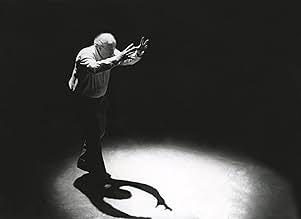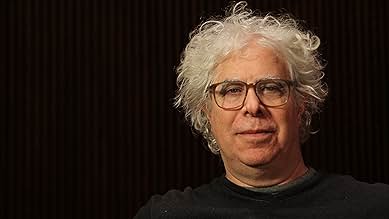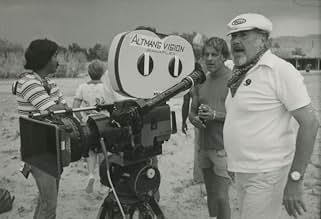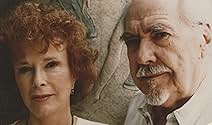IMDb RATING
6.8/10
1.5K
YOUR RATING
A look at the life and work of American film-maker Robert Altman.A look at the life and work of American film-maker Robert Altman.A look at the life and work of American film-maker Robert Altman.
- Awards
- 1 nomination total
Robert Altman
- Self
- (archive footage)
Kathryn Reed
- Self
- (as Kathryn Reed Altman)
Donald Sutherland
- Self
- (archive footage)
Dick Cavett
- Self
- (archive footage)
Tommy Thompson
- Self
- (archive footage)
Vilmos Zsigmond
- Self
- (archive footage)
Matthew R. Altman
- Self
- (voice)
- (as Matthew Reed Altman)
Stephen Altman
- Self
- (voice)
Richard Nixon
- Self
- (archive footage)
Shelley Duvall
- Self
- (archive footage)
Paul Dooley
- Self
- (archive footage)
- Director
- Writer
- All cast & crew
- Production, box office & more at IMDbPro
Featured reviews
In 2014, a documentary about one of my favourite filmmakers was finally released. This is by no means a perfect documentary, but any film lover or fan of his work absolutely needs to see this.
Robert Altman started from the bottom of showbiz then worked his way up to directing tv shows. How? He did lots of lying. Then in 1970, he started the boom of new up and coming directors trying to make names for themselves. These new directors included Steven Spielberg, Martin Scorsese, and George Lucas, and the movement came to be known as "The New Wave of American Cinema". The year was 1970 and Altman created the well-liked 'Brewster McCloud' and the highly acclaimed anti-war film 'M*A*S*H'. Altman's desire to explore unconventional takes for his films led to making "anti-" films. 'M*A*S*H' had no violence making it anti-war. Some of these other "anti" film included anti-western (McCabe & Mrs. Miller, my personal favourite of his), and anti-friendship (3 Women).
By the late 70s, Altman was falling into a slump when his film 'Quintet' didn't live up to expectations of his earlier masterpieces. But it was the his live action take on 'Popeye' in 1980 that ruined his film career throughout the rest of the decade. Barely getting film offers anymore, he tried directing theatre. He loved theatre just as much.
Things were looking up when he made the darkly comical satire 'The Player' in 1992. He was back on top again. Everything about that film is pitch perfect. A year later he does 'Short Cuts', one of the best epics with multiple stories ever made. The remainder of his career saw some back and forth hits with his Agatha Christie inspired 'Gosford Park' and final film project 'A Prairie Home Companion' being notable highs.
It felt to me that this documentary moved a little too fast. Rather than gliding along everything, it tried to fit into some kind of allotted time. And I also felt that they should have gone into more detail on what made Robert Altman an auteur.
So this may not be perfect, but it is definitely a movie-lover's dream come alive.
3.5/4
Robert Altman started from the bottom of showbiz then worked his way up to directing tv shows. How? He did lots of lying. Then in 1970, he started the boom of new up and coming directors trying to make names for themselves. These new directors included Steven Spielberg, Martin Scorsese, and George Lucas, and the movement came to be known as "The New Wave of American Cinema". The year was 1970 and Altman created the well-liked 'Brewster McCloud' and the highly acclaimed anti-war film 'M*A*S*H'. Altman's desire to explore unconventional takes for his films led to making "anti-" films. 'M*A*S*H' had no violence making it anti-war. Some of these other "anti" film included anti-western (McCabe & Mrs. Miller, my personal favourite of his), and anti-friendship (3 Women).
By the late 70s, Altman was falling into a slump when his film 'Quintet' didn't live up to expectations of his earlier masterpieces. But it was the his live action take on 'Popeye' in 1980 that ruined his film career throughout the rest of the decade. Barely getting film offers anymore, he tried directing theatre. He loved theatre just as much.
Things were looking up when he made the darkly comical satire 'The Player' in 1992. He was back on top again. Everything about that film is pitch perfect. A year later he does 'Short Cuts', one of the best epics with multiple stories ever made. The remainder of his career saw some back and forth hits with his Agatha Christie inspired 'Gosford Park' and final film project 'A Prairie Home Companion' being notable highs.
It felt to me that this documentary moved a little too fast. Rather than gliding along everything, it tried to fit into some kind of allotted time. And I also felt that they should have gone into more detail on what made Robert Altman an auteur.
So this may not be perfect, but it is definitely a movie-lover's dream come alive.
3.5/4
The biggest value of Ron Mann's documentary "Altman" is the compilation of Robert Altman's interviews, home movies, unreleased shorts and testimonies by family members and colleagues. All that material was unified by close-ups of several actors who define what the adjective "Altmanesque" means, but a few important ones were left out, people as Altmanesque as can be, as Shelley Duvall, Paul Dooley, Carol Burnett or René Auberjonois. In general, Altman's film work was somehow standardized in this documentary, as if all had the same significance and weight. As an effect of leveling the value and quality of his movies, what we have is a promenade through a life and peculiar oeuvre, that did find obstacles, as it is stated, but with little curiosity for the reasons and motives, and the conceptual and ideological genesis behind Altman and his cinema. When Mann covers Altman's years at Fox, he only gives «3 Women», the peak of that period, a few reflections about acting illustrated by photographs of the shooting and Duvall, Sissy Spacek and Janice Rule (the tree women of the title). Any unsuspecting fellow will never know that this is one of Altman's masterpieces, as such recognized by anyone who knows a little about films. And let's not mention the approach to «Nashville», which is almost reduced to a corollary of a testimony by Richard Nixon about folk music. From the vantage point given by the time that has passed since the releases of «HealtH» (which didn't even have a proper release), «Quintet» and «Popeye», neither does Mann question or evaluate what was written and said about them. He does quote Altman telling a story about «Quintet»: in a meeting at Fox Grace of Monaco questioned Alan Ladd Jr. for letting "that Altman person" put her friend Paul Newman in that "dreadful film". Ladd told her to shut up and quit Fox. Today «Quintet» is seen as an apocalyptic science- fiction dreamscape that completes Altman's surrealist trilogy, after «Images» and «3 Women». Robin Williams died without understanding that in «Popeye» he had given one of his best film performances. Neither Mann seems to understand the film and, in return, concedes valuable time of the documentary to a clip of an unmentionable television film critic who could only mutter nonsense about Altman's vision of E.C. Segar's universe the morning after the film premiere. It must be added too that the appreciation of «Popeye» has improved with the years. As Mann lightly approaches other interesting works, as Altman's theater adaptations («Fool for Love», «Streamers», «Come Back to the 5 & Dime, Jimmy Dean, Jimmy Dean», «Beyond Therapy», all underrated), the biopic «Vincent & Théo», the drama «Kansas City» that follows the structure (if any) of a jazz session, or the comedies he made after his heart transplant (the delirious «Dr. T and the Women» and the moving «Cookie's Fortune», for example), Mann spends more than enough time in «Secret Honor», the television series «Tanner» or »Brewster McCloud» which Altman called his favorite film in an interview in "Film Comment" when he was about to make «Short Cuts». And so goes this work, in which, yes, we can perceive the admiration for the filmmaker, but that in general, as we have stated, misses in its reflection and analysis of the work of one of the greatest American filmmakers of the twentieth century and part of this one (above a few overrated defenders of the status quo), who talked about and filmed his fellow people, his country, its history, its cities, towns, politics, cultures, vices and virtues. And there lies his greatness.
I am fascinated by the artistic process, how things are created, what motivates the artist, what obstacles are encountered and how they are overcome. In this documentary, I think Ron Mann has succinctly put together the various factors that motivated Robert Altman and made his career so long and successful. I felt I learned a lot more about the movie making process and artistic creation in general.
Simple things we now take for granted are important. For instance, putting together a team of people that work well together, giving people a break and letting them shine. These were radical ideas in the era of C2C Command and Control studio structures, where the word was passed down from on high. How about two people arguing, both speaking at the same time. Adds to the emotion and conflict right? Altman pioneered the use of multiple soundtracks to get right into a dialogue.
What I found particularly interesting was how Altman dealt with career setbacks. Each time things did not seem to be going his way (at least by the standards of others), he simply reinvented himself by turning to a different genre of film or theatre or production. When confronted by harsh critics, he simply shrugged it off and kept on working with undiminished enthusiasm. What a wonderful role model for young people starting off on a career. Bravo, great doc!!
Simple things we now take for granted are important. For instance, putting together a team of people that work well together, giving people a break and letting them shine. These were radical ideas in the era of C2C Command and Control studio structures, where the word was passed down from on high. How about two people arguing, both speaking at the same time. Adds to the emotion and conflict right? Altman pioneered the use of multiple soundtracks to get right into a dialogue.
What I found particularly interesting was how Altman dealt with career setbacks. Each time things did not seem to be going his way (at least by the standards of others), he simply reinvented himself by turning to a different genre of film or theatre or production. When confronted by harsh critics, he simply shrugged it off and kept on working with undiminished enthusiasm. What a wonderful role model for young people starting off on a career. Bravo, great doc!!
Altman's life merits a 10-hour documentary. This is only 1½ hours, but we are treated to a decent selection of Altman trivia.
Gosford Park, M.A.S.H., Nashville, Short Cuts, The Player. Just wow.
The downside of cutting it down to a feature length documentary is that you are forced to skim through many great films. First of all, he made so many movies it's hard to keep track of them. Second of all, his movies are so dense that they require multiple viewings, and more than two minutes of exposition, to fully appreciate.
Nonetheless, I think the film is well-made and never boring.
Family videos and photos, and on-location footage, provide access to a rarely-seen Altman, such as Altman-the-father.
But don't expect great revelations. There is nothing truly shocking here, no skeletons in the closet. Altman is painted as a suspiciously lovable, but subversive, Santa Claus figure. Perhaps that's just the way he was.
But one would have liked a few rough edges to be explored a bit more - like his family troubles, financial worries and personal addictions to gambling and booze. The movies gets too close to hagiography at times. But if one is to pick Saints for canonization, you could do much worse than go with Robert Altman!
Gosford Park, M.A.S.H., Nashville, Short Cuts, The Player. Just wow.
The downside of cutting it down to a feature length documentary is that you are forced to skim through many great films. First of all, he made so many movies it's hard to keep track of them. Second of all, his movies are so dense that they require multiple viewings, and more than two minutes of exposition, to fully appreciate.
Nonetheless, I think the film is well-made and never boring.
Family videos and photos, and on-location footage, provide access to a rarely-seen Altman, such as Altman-the-father.
But don't expect great revelations. There is nothing truly shocking here, no skeletons in the closet. Altman is painted as a suspiciously lovable, but subversive, Santa Claus figure. Perhaps that's just the way he was.
But one would have liked a few rough edges to be explored a bit more - like his family troubles, financial worries and personal addictions to gambling and booze. The movies gets too close to hagiography at times. But if one is to pick Saints for canonization, you could do much worse than go with Robert Altman!
Robert Altman is admired amongst directors and actors, but despised amongst the producers of Hollywood. Isnt it ironic that some of his best work (The Player) is a terrific parody of all the pittfalls Hollywood digs for those trying to make a movie.
I have always wondered why there is such an admiration for him as a director, but the admiration grew out of his love for movie making and his love for the actors. And that love is being returned now. He treated his actors and his movie crew in a way few other Hollywood directors did. Robert Altman's movies seemed to be sort of a family/friends gathering of like minded spirits, who supported each other.
This guy made some terrific movies and he also made quite a few stinkers, movies that really were below par. But Robert Altman's talents never faded, his passion never faded, it was the Hollywood industry that did or did not give him the chance to film the way he wanted to, resulting in periods of success and periods of drought and failures.
I'll always remember Altman for his classic movies. And after seeing this movie I'll also will dearly remember him as a sort of a father of the actor's community. Too bad he got an early stroke, after which he finally had to give up drinking. But up untill then he lived his live to the fullest, giving us audiences worldwide several beautiful movie classics!
BRAVO !!!
I have always wondered why there is such an admiration for him as a director, but the admiration grew out of his love for movie making and his love for the actors. And that love is being returned now. He treated his actors and his movie crew in a way few other Hollywood directors did. Robert Altman's movies seemed to be sort of a family/friends gathering of like minded spirits, who supported each other.
This guy made some terrific movies and he also made quite a few stinkers, movies that really were below par. But Robert Altman's talents never faded, his passion never faded, it was the Hollywood industry that did or did not give him the chance to film the way he wanted to, resulting in periods of success and periods of drought and failures.
I'll always remember Altman for his classic movies. And after seeing this movie I'll also will dearly remember him as a sort of a father of the actor's community. Too bad he got an early stroke, after which he finally had to give up drinking. But up untill then he lived his live to the fullest, giving us audiences worldwide several beautiful movie classics!
BRAVO !!!
Did you know
- Quotes
Robin Williams: Altmanesque? Ha-ha. Expect the unexpected.
- Crazy creditsNo hippies were harmed in the making of this movie.
- ConnectionsFeatures Brève rencontre (1945)
- SoundtracksLes Boréades: Overture
Written by Jean-Philippe Rameau (as Jean-Phillipe Rameau)
Performed by John Eliot Gardiner
Details
Box office
- Gross worldwide
- $996
Contribute to this page
Suggest an edit or add missing content


































